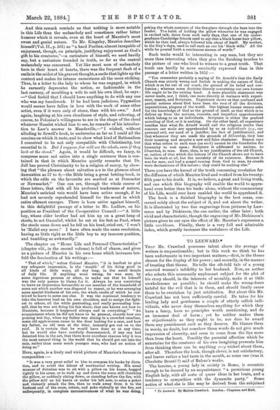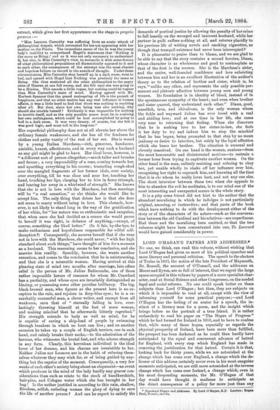TO LEEWARD.* Tufa Mr. Crawford possesses talent above the average
of writers is unquestionable ; but in this work we think be has
been unfortunate in two important matters,—first, in the theme chosen for the display of his power ; and secondly, in the manner of treating that theme. He tells the oft-told tale of a young married woman's infidelity to her husband. Now, an author who selects this necessarily unpleasant subject for the plot of bis story should, in the interests of morality, make it as little unwholesome as possible ; he should make the wrong-doers hateful for the evil that is in them, and should finally cause them to be overtaken by just retribution. But about this Mr. Crawford has not been sufficiently careful. He takes for his leading lady and gentleman a couple of utterly selfish indi- viduals, who never deny themselves anything for which they have a fancy, have no principles worth mentioning, and do an immense deal of harm ; yet he neither makes them as objectionable as they ought to be, nor does he award them any punishment such as they deserve. He blames them in words, no doubt, but somehow those words do not give much impression of sincerity, and seem to come from the lips more than from the heart. Possibly the parental affection which he entertains for the creatures of his own imagining prevents him from thinking there can be anything very wicked about them5 after all. Therefore the book, though clever, is not satisfactory, and leaves rather a bad taste in the month, as some one (was it Charlotte Brontë P) said of Balzac's works.
The heroine, a young lady in soziety in Rome, is eccentric enough to be deemed by an acquaintance "a pernicious young English lady, with all sorts of queer ideas in her brain, and a tendency to sympathise with the dynamite party." Some notion of what she is like may be derived from the subjoined
• To Leeward. By Marion Crawford. London Chapman and HAIL
extract, which gives her first appearance on the stage in propria persona :—
" Miss Leonora Carnethy was suffering from an acute attack of philosophical despair, which accounted for her not appearing with her mother on the Pincio. The immediate cause of the fit was the young lady's inability to comprehend Hegel's statement that • Nothing is the same as Being ;' and as it was not only necessary to understand it, but also, in Miss Carnethy's view, to reconcile it with some dozens of other philosophical propositions all diametrically opposed to it and to each other, the consequence of the attempt was the most chaotic and hopeless failure on record in the annals of thought. Under these circumstances, Miss Carnethy shut herself up in a dark room, went to bed, and agreed with Hegel that Nothing was precisely the same as Being. She thus scattered all the other philosophies to the angry airts of Heaven at one fell sweep, and she felt sure she was going to be a Hindoo. This Bounds a little vague, bnt nothing could be vaguer than Mies Carnetby's state of mind. Having agreed with Mr. Herbert Spencer that the grand mainspring of life is the pursuit of happiness, and that no other motive has any real influence in human affairs, it was a little hard to find that there was nothing in anything after all. But then, since her own being was also nothing, why should she trouble herself ? Evidently it was impossible for nothing to trouble itself, and so the only possible peace must lie in realising her own nothingness, which could be best accomplished by going to bed in a dark room. It was very dreary, of course, but she felt it was good logic, and mast tell in the long-run."
Her superficial philosophy does not at all elevate her above the ordinary female weaknesses, and she has all the fondness for clothes and petty vanity of the rest of her sex. She is wooed by a young Italian Marchese,—rich, generous, handsome, amiable, honest, affectionate, and in every way such a husband as any girl might be glad to have. Her ideal lover, however, is "a different sort of person altogether,—much taller and broader and fiercer ; a very impossibility of a man, coming towards her, and upsetting everything in his course ; trampling rough-shod over the mangled fragments of her former idols, over society, over everything, till he vo as close and near her, touching her hand, touching her lips, clasping her to him in fierce triumph, and bearing her away in a whirlwind of strength." She knows that she is not in love with the Marchese, but then marriage will be "a real sensation," so she thinks she would like to accept him. The only thing that deters her is that she does not mean to marry without being in love. This obstacle, how- ever, is not likely to stand long in the way of the gratification of her whim, for "her nature was so enthusiastic and sanguine, that when once she had decided on a course she would prove to herself it was right, in defiance of anything,—except, of course, something she liked better." (Is it fair, by-the-bye, to make enthusiasm and hopefulness responsible for wilful self- deception P) Consequently, she assures herself that if she were not in love with the Marchese, she could never, "with her high standard about such things," have thought of him for a moment as a husband. This reasoning seems to her conclusive, and she marries him readily. Speedily, however, she wants another sensation, and comes to the conclusion that he is uninteresting, and that she is a miserable woman. Having arrived at this pleasing state of mind two months after marriage, fate offers relief in the person of Mr. Julius Batiscombe, one of those rather impossible heroes of romance for whom Mr. Crawford has a partiality, and whose eyes are invariably cistinguished as blazing, or possessing some other peculiar brilliancy. The big, black-browed man, who figures as the present hero is no ex- ception to the rule, and rejoices in fiery-blue eyes ; he is a re- markably successful man, a clever writer, and exempt from all weakness, save that of " eternally falling in love, ever- lastingly throwing himself at the feet of some woman, and making mischief that he afterwards bitterly regretted." His strength extends to body as well as mind, for he is capable of saving a ship-load of people by swimming through breakers in which no boat can live ; and on another occasion he takes up a couple of English terriers, one in each hand, and calmly breaks their necks,—to the admiration of the heroine, who witnesses the brutal feat, and who adores strength in any form. Clearly, this herculean individual is the ideal lover of her dreams, and his charms are irresistible to her. Neither Julius nor Leonora are in the habit of refusing them- selves whatever they may wish for, or of being guided by any- thing but the caprice of the moment. Consequently, a very few weeks of each other's society bring about an elopement—an event which produces in the mind of the lady hardly any graver con- siderations than such as relate to the stock of handkerchiefs, hair-pins, and Cologne water which she has brought in her bag Is the author justified in according to this vain, shallow, frivolous, selfish, unfeeling woman the glory of dying to save the life of another person ? And can he expect to satisfy the
demands of poetical justice by allowing the penalty of her crime to fall heavily on the wronged and innocent husband, while her partner in guilt suffers nothing at all, and returns placidly to his previous life of writing novels and smoking cigarettes, as though that tranquil existence had never been interrupted?
It is pleasanter to praise than to blame, and we are glad to be able to say that the story contains a second heroine, Diana, whose character is as wholesome and good to contemplate as that of the first is the reverse. She is the Marchese's sister, and the entire, well-founded confidence and love subsisting between him and her is an excellent illustration of the author's theory as to the relation of brother and sister, which is, he says," unlike any other, and represents the only possible per- manent and platonic affection between young men and young women. Its foundation is in identity of blood, instead of in the spontaneous sympathy of the heart; and even when brother and sister quarrel, they understand each other." Diana, good, unselfish, true, and chivalrous, is the only woman whom the fickle and wayward Julius has ever loved with a real and abiding love ; and at one time in her life, she came very near to returning that feeling. When she discovers that he is making love to her sister-in-law, she feels it her duty to try and induce him to stop the mischief that he has begun, being prompted to that step by no mean jealousy or desire to interfere, but solely by the loyal affection which she bears her brother. The situation is unusual and cleverly conceived. On one hand is the woman, anxious—from the most honourable and disinterested motives—to restrain a former lover from trying to captivate another woman. On the other hand is the man, sullenly resisting and refusing to obey her, yet unable wholly to shake off her influence over him, recognising her right to reproach him, and knowing all the time that it is she whom he really loves best, and not any one else. The short interview between these two when she appeals to him to abandon the evil he meditates, is to our mind one of the most interesting and unexpected scenes in the whole story.
It is a pity some friend did not hint to the author that the abundant moralising in which be indulges is not particularly original, amusing, or instructive ; and that parts of the book which have nothing to do with the development either of the story or of the characters of its actors—such as the conversa- tion between the old Cardinal and his relatives—are superfluous. Had these and the moralising been omitted, so that the two volumes might have been concentrated into one, To Leeward would have gained considerably in power.



































 Previous page
Previous page